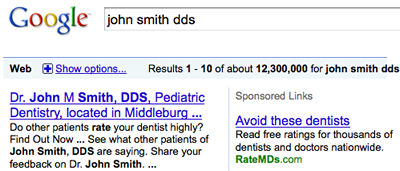Are Competitors Using Your Name To Advertise Online?
The author is not an attorney and nothing here is to be construed as legal advice
If you type your name into Google these days, the odds are that you’ll find a number of search results that lead to profile pages on sites that you’ve never heard of before. (Go ahead – Google your name and see for yourself!) This is because the multitudes of review sites that exist on the web have created pages under your name with your publicly available information (think phone books, census data, etc.). This, in and of itself isn’t illegal, since all they’re doing is reposting public, non-copyrighted information.
It begins to get a bit more complicated when these sites begin using the profile they’ve established under your name to advertise for other dentists. Many review sites have begun “name-squatting” on dentists’ names in order to do just this. Here’s how it works…
A patient will search for “John Smith DDS” in order to find Dr. Smith’s phone number to make an appointment. The first search result may be a review site stating it has Dr. John Smith’s contact info. The patient then clicks through to the page, and finds a page with Dr. Smith’s info, and advertisements for Dr. Joe Johnson – Dr. John Smith’s competitor across the street.
Some sites are taking it one step further and actively advertising on Google with paid advertising for dentists’ names – right in the search results. It gets even worse when the advertisement that appears for a search of “John Smith DDS” contains “Avoid These Dentists” wording like the following example:

The first wave of lawsuits against Google for allowing this practice have all dealt with trademark infringement, and haven’t established any clear precedent as to the legality of this practice. Plus, you have to consider that just because it’s your name, doesn’t mean that it’s a licensed trademark. The real question seems to be whether this practice abides by the standards of fair business practice, and whether the website involved in this practice is acting as a publisher or a host.
The California Unfair Business Practices Act maintains that businesses that practice deceptive or misleading advertising may be subject to civil lawsuit, including penalties. By deliberately introducing confusion into the marketplace, there are some who argue this practice violates this section of California’s Business and Professions Code.
The next question is “who’s responsible?” If the website participating in this practice is doing so by injecting editorial commentary about you, then it’s acting as a publisher and may be held accountable for their actions. If the website is merely hosting these dubious advertisements for a third-party, then the onus for this practice could be passed along to the third-party.
Whichever way you look at it, the emergence of online advertising has opened up a whole new universe of legal questions. And, it will certainly be interesting to see what precedents the courts set in the following year.
















